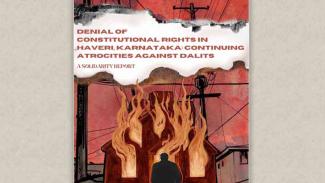
On 3rd March 2023, Ramesh and his mother Hemavva, belonging to the Madiga community, a Dalit sub-caste in Karnataka, attempted to enter the Basaveshwara temple in Nandihalli village, Haveri District, Karnataka. Soon a wave of anti-dalit violence was unleashed by the dominant-caste persons (Lingayat Caste) in the village, who damaged their homes, set at least two Dalit homes on fire in retaliation, pelted stones, molested Dalit women, destroyed Ramesh’s property, and set fire to two houses in the village’s Dalit colony. This incident is just one of many that go unreported in Nandihalli and falls on the deaf ears of the Government.
Denial of Constitutional Rights in Haveri, Karnataka: Continuing Atrocities Against Dalits, a report by AISA, AIPWA and AILAJ noted that in Haveri District caste discrimination and violence is a daily reality for members of the Dalit community. Ranging from social and economic boycotts to perpetuation of manual scavenging and denial of access to public facilities including public taps, temples and burial grounds, the guarantees of equality and liberation by the Indian Constitution have long eluded the Dalit community in the area.
The AISA-AIPWA-AILAJ team, along with Swabhimani Dalit Shakti, a local Dalit rights organisation held conversation with victims and also with different stakeholders ranging from the Panchayat Development Officer, Deputy Superintendent of Police, Halageri Police Station to the Assistant Director of the Social Welfare Department on the 3rd March incident and continuing practices of caste discrimination in the village.
The Dalit residents informed the team that undoubtedly, the incidents of atrocities are only increasing, and that none of them has been provided any awareness or information regarding the law, schemes, and benefits available to them. Even the Grama Sabha is dominated only by dominant caste persons, and as the Grama Sabha holds meetings mostly in the temple, Dalits are never called for the meetings. There were no incidents of inter-caste marriages in the village, and the Anganwadi does not have any Dalit employees. They face severe droughts without the rains, and during the rains, their houses get flooded. In fact, during the last spate of rains, 2 houses had fallen. Even most sweepers (Pourakarmikas) are not directly appointed by the Government, and are mostly paid in daily wages. Historically, the Dalit residents were not permitted to use the common burial grounds.
The Dalit residents of Nandihalli informed the solidarity team that they were made to clean the open gutters near their homes with their hands, without the use of any jetting machines. This amounts to manual scavenging and is a clear exploitation by the State.
When the practice of forcing Dalit community members to use their bare hands for manual scavenging was pointed to the Panchayat Development Officer he unequivocally denied the practice. When it was further pointed out that people cannot be used for manual scavenging he responded that the panchayat has no money to afford machines.
The report also points towards the glaring failure of the police and local administration to deal with such incidents of violence against Dalits. In response to questions on why proper information and updates on police investigation was not being provided to the complainants, The Deputy Commissioner of Police retorted that it was the responsibility of the complainants to come to the police station and seek an update. He said he has done his duty, and that all other issues must be raised with the Social Welfare Department. When the Assistant Director of the Social Welfare Department was approached, he stated that his office has conducted a spot inspection and submitted necessary reports with higher authorities in the Department. He stated that only when the District Commissioner submits its reports can compensation be released to the victims. The Deputy Commissioner of Haveri District, Mr. Raghunandan Murthy stated that the issues of caste discrimination were of the past. And that the last incident to occur was over two years old. Meanwhile Dalit leaders protesting against atrocities – including a leader of the Dalit group Swabhimani Dalit Shakti – continue to be attacked and receive death threats.
All in all, there is a systemic breakdown of law, and rampant violations of the rights of the Dalit community in Nandahalli village, and more broadly in the Haveri district. Constitutional promises of right to life, liberty and dignity of the Dalit community under Article 21 have been squandered. Their rights guaranteed through Articles 15 and 17, which prohibit discrimination on the basis of caste, and abolishes untouchability have been violated.
The report notes, given the breakdown of state accountability and large scale violations of rights of the Dalit community, the Government must immediately constitute a Vigilance and Monitoring committee to effectively implement the Atrocities Act, 1989 and Rules, 1995, rehabilitate the victims and urgently disburse compensation and other allowances to the victims and their families.
Charu Bhawan, U-90, Shakarpur, Delhi 110092
Phone: +91-11-42785864 | Fax:+91-11-42785864 | +91 9717274961
E-mail: info@cpiml.org




